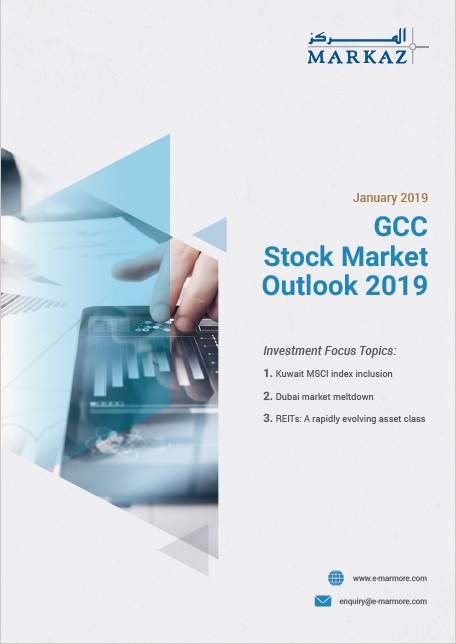Executive Summary
Amidst muted growth expectations in global markets, economic outlook for the GCC region as a whole remains positive, as the surge in oil revenues and fiscal reforms of yesteryears will provide the necessary cushion for GCC countries to support economic growth through capital expenditure. Although the recovery in Oil prices did not last the entirety of the year, GCC economies witnessed a sizeable increase in oil revenues. Their fiscal and external balances started to recover after three lacklustre years with only Bahrain and Oman running twin deficits in 2018. With the exception of Bahrain, where there is weakness in government finances, economic factors remain largely favourable.
Growth in corporate earnings is expected to witness an uptick in the GCC during 2019 with the exception of Bahrain and Saudi Arabia. Banks will be the primary growth drivers, as the sector is expected to see a rise in profitability and credit growth due to tailwinds such as rising interest rates and new infrastructure projects. Commodity related companies are likely to see their earnings drop due to the fall in oil prices while the construction sector is expected to mildly rebound after years of underperformance.
From a valuation perspective, GCC markets except Saudi Arabia and Qatar remain at attractive levels. As earnings are expected to remain flat for Saudi stocks, it becomes difficult to justify their premium valuations. Similarly, Qatar is expected to undergo consolidation in 2019 after witnessing a rally during the second half of 2018. Market liquidity remains to be a pain point for GCC equity markets as institutional and foreign investor participation continues to remain low, weighed down by geopolitical concerns.
At the start of 2018, we were neutral on the Saudi Arabia, UAE and Kuwait, while remaining negative on Qatar. Saudi Arabia and Kuwait were in line with our expectations, gaining 8.3% and 7.8% respectively during the year. The UAE was a mixed bag, with Abu Dhabi and Dubai moving in opposite directions. Rise in Oil prices and government support supplemented the growth of Abu Dhabi while the slowdown of economic growth and the weakness in real estate market weighed in on Dubai. Qatar markets performed contrary to our expectations as the country successfully overcame the effects of the diplomatic standoff, which was initially expected to have a bearing on the country's economy. Quick establishment of alternate trade routes and the support lent to the banking system through the injection of government deposits helped the economy to stage a turnaround.
FAQ
Table of Contents
- Executive Summary
- Looking Back at 2018
- Country-wise Performance Analysis
- What to Expect in 2019?
- Kuwait MSCI index inclusion
- Dubai market meltdown
- REITs: A rapidly evolving asset class
- Appendix

